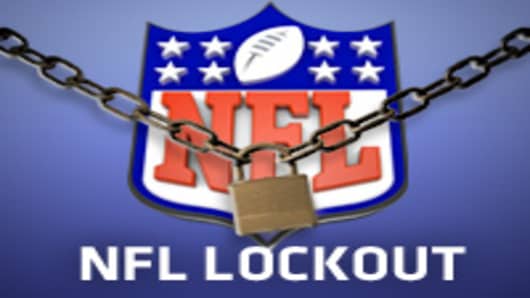The NFL lost a major piece of leverage in the labor negotiations last night when federal judge David S. Doty ruled that the NFL's extensions with its television partners, that included payments made even during a work stoppage, were not negotiated in good faith.
On the line was $4 billion of television revenue that the NFL owners would have received and could have used that money to pay down the debt they owe on their stadiums.
Paging through the ruling, I was shocked at a couple items.
The first one that blew me away was that DirecTV actually agreed to pay the NFL up to nine percent more for a year in which they might broadcast no games versus a regular season.
Is that the NFL doing a good job and buying themselves insurance or is all this disingenuous? I know the league has leverage against the networks, but there's something that smells funny about making more money off nothing.
The other item that caught me off guard was the fact that the league would actually get to keep $421 million no matter what happened with the season. I had thought the TV money in a lockout was just a loan of sorts since the money had to be paid back to networks with interest. In NBC's case, a year long work stoppage would result in the league adding an additional year on to the contract and giving NBC the Super Bowl broadcast that year.(*)
These negotiations are still very much about the issues.The split of revenues, the owners wanting an additional $1 billion credit skimmed off the top before sharing with the players (despite resisting the opening of their books), the rookie wage scale, the 18-game season and the benefits for current and former players.
But playing the chess game well is just as important. That's why the NFL Players Association is planning on decertifying so that it can file an anti-trust lawsuit and get the back-and-forth into the court system, where it will go back to Judge Doty, who has presided over the Collective Bargaining Agreement since 1992 when he ruled that the NFL was guilty of violating antitrust laws.
"Both sides know that the number one factor that will affect negotiations is how close it gets to the season."
The NFL is expected to argue that the decertification is a tactic and shouldn't be allowed. Owners are obviously concerned because when the players decertified in 1987, they played without being union members while the court made its antitrust decision.
The owners have said that they aren't willing to field replacement players and they aren't willing to use players who are suing them this time.
I always believed the owners had huge leverage over the players. It's as simple as the average career being 3 1/2 seasons and many players having trouble saving their money. But as we head into the final hours before the Collective Bargaining Agreement expires, I feel like the union has more power than it has ever had thanks to the TV money ruling and the chance of getting before Judge Doty, who the NFL tried to get thrown off presiding over the CBA three years ago after he ruled that Michael Vick didn't have to return $16.5 million in bonus money.
Don't expect anything to get done any time soon. If this all heads to court, the system isn't exactly quick at making decisions. Both sides know that the number one factor that will affect negotiations is how close it gets to the season. When one side starts to get nervous and calculates that revenues lost now aren't worth sacrificing to get a better deal in the future, that's when we'll have a new agreement.
For continuing coverage of the NFL Labor Battle, check back on the blog and follow along on Twitter @darrenrovell
(*Note: Both NBC and CNBC are owned by majority partner Comcast and minority partner General Electric .)
Questions? Comments? SportsBiz@cnbc.com



